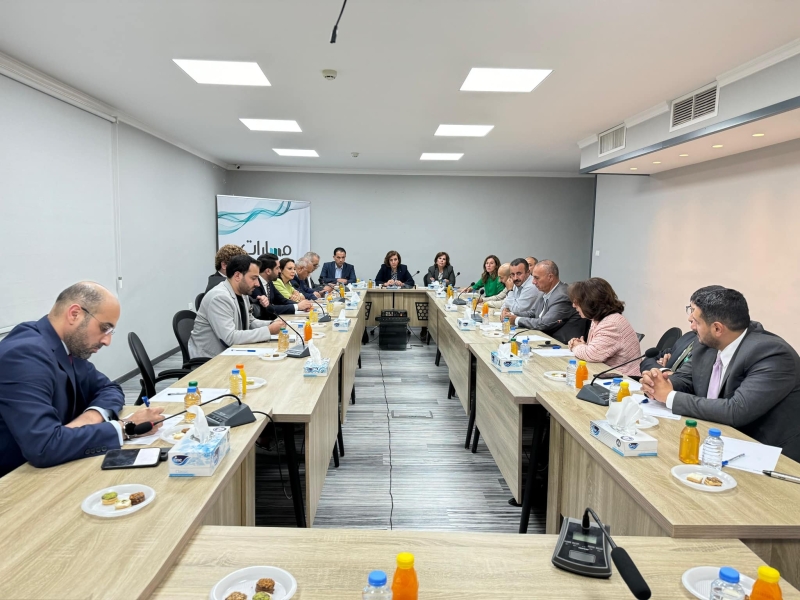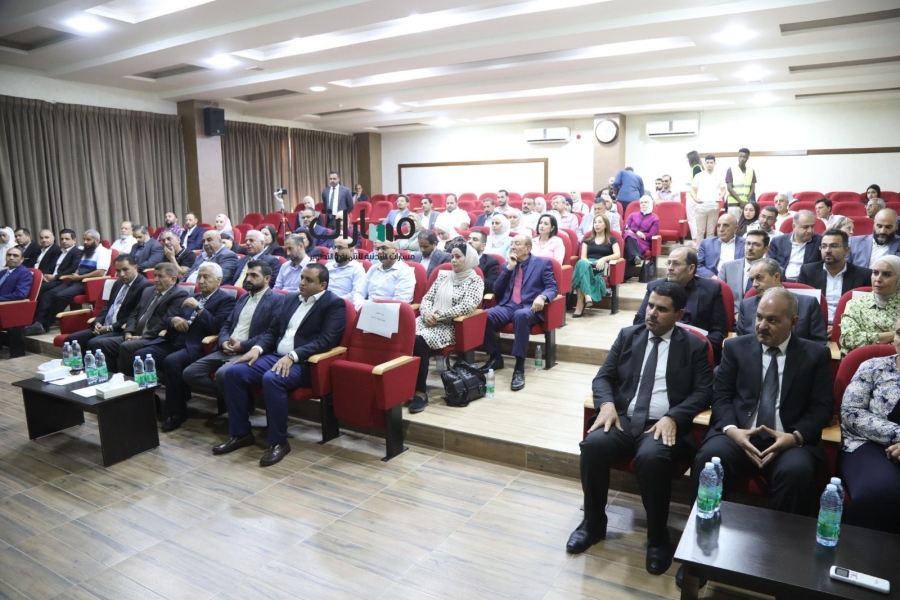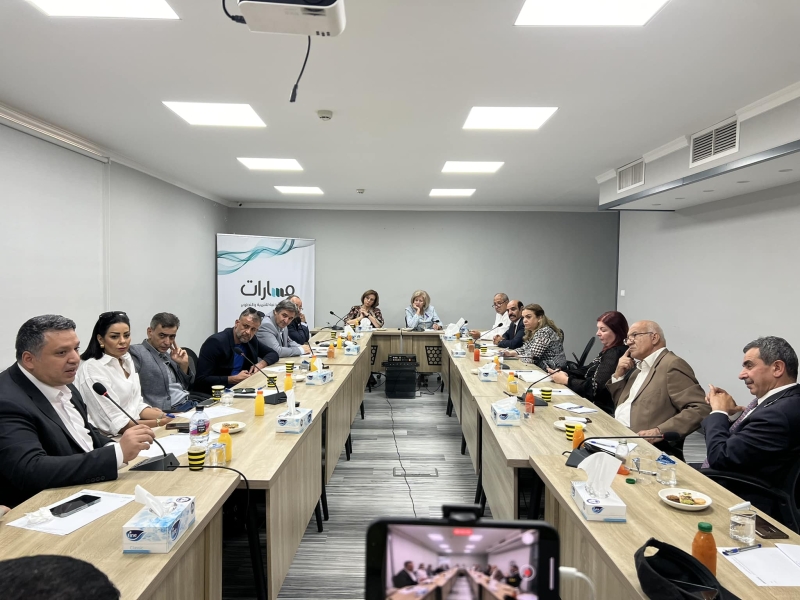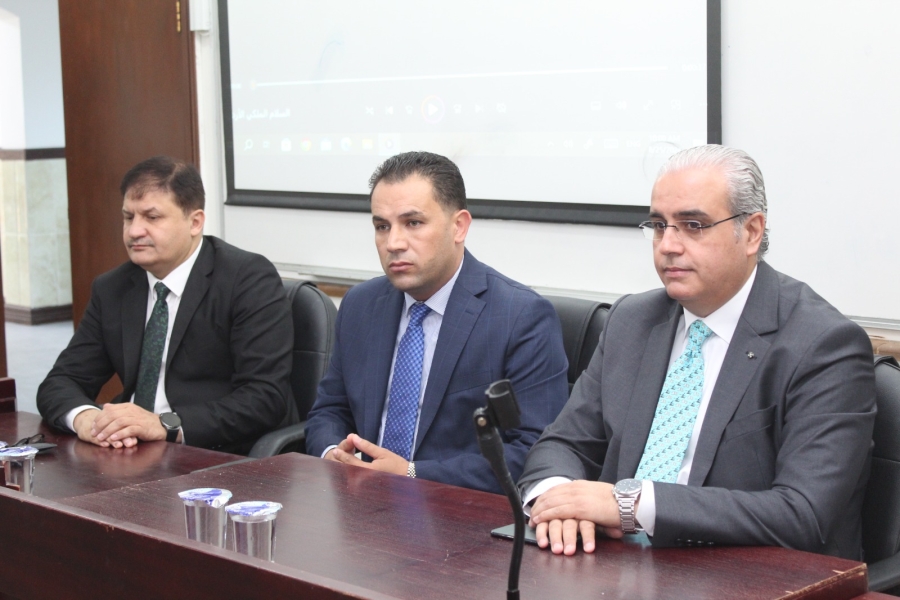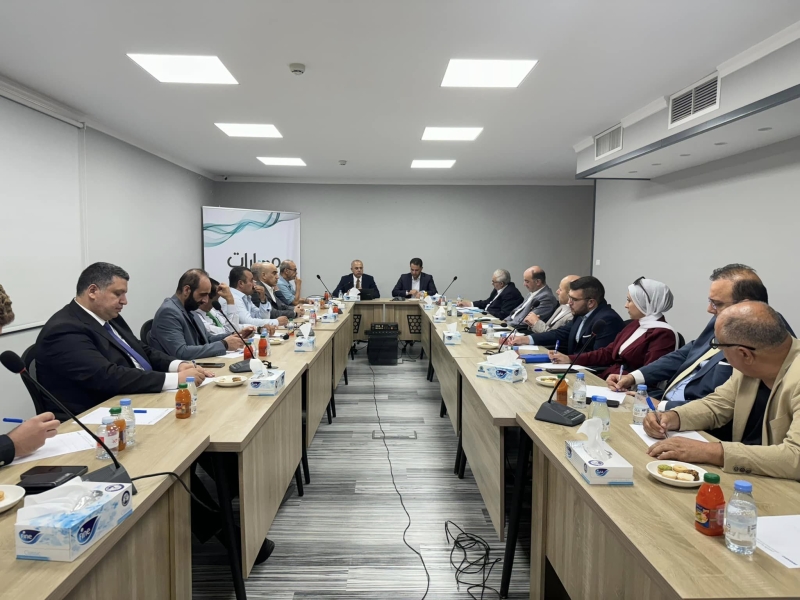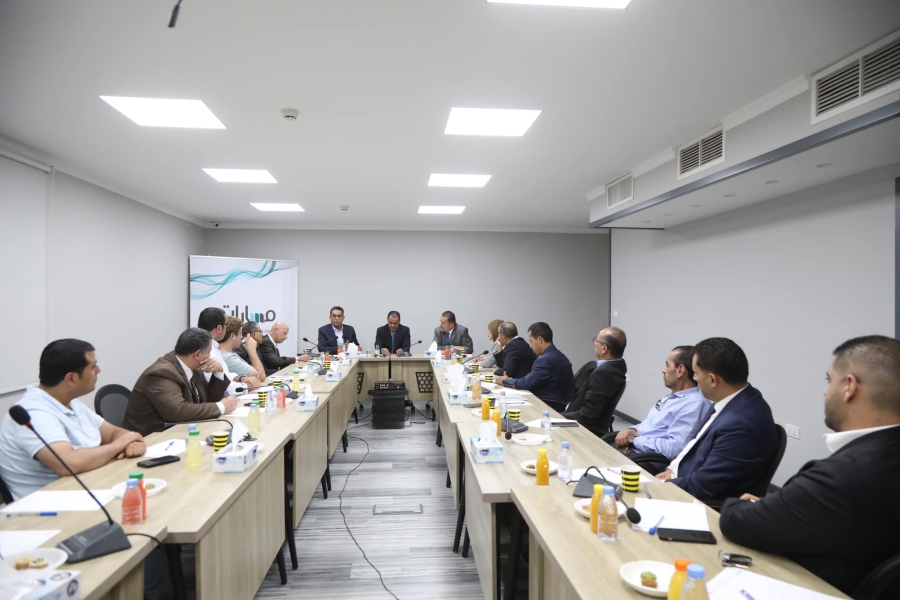“مسارات الأردنية” تناقش مشروع قانون الأحزاب والتوصيات المتعلقة به
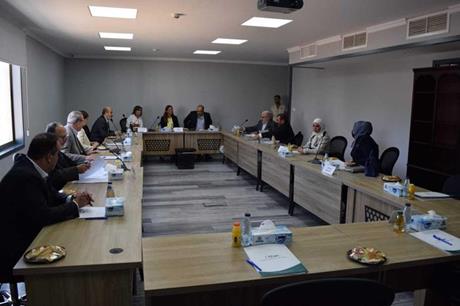
عقدت مؤسسة مسارات الأردنية للتنمية والتطوير، اليوم الإثنين، في مقرها بالعاصمة عمان، جلسةً حواريةً مفتوحة مع مجموعةٍ من الخبراء في الشأن الحزبي والنيابي، تحت عنوان “كيف ستتعامل الأحزاب القائمة مع مشروع اللجنة الملكية المتعلق بقانون الأحزاب؟”
وجاءت الجلسة لمناقشة مخرجات اللجنة الملكية لتحديث المنظومة السياسية المتعلقة بمشروع قانون الأحزاب الجديد وتوصيات لجنة الأحزاب المنبثقة عن اللجنة الملكية، وذلك ضمن عدة محاور؛ تشمل كيفية تعامل الأحزاب القائمة مع مخرجات اللجنة، ونظام التمويل الجديد وعلاقته بمشاركة المرأة والشباب، وإمكانية اندماج الأحزاب، واستشراف شكل الأحزاب في المرحلة المقبلة
وقال الأمين العام لحزب جبهة العمل الإسلامي، المهندس مراد العضايلة، إن الحزب تكيّف مع كل القوانين التي صدرت سابقًا، ولكن لا يجب أن يكون قانون الأحزاب في الأصل قانون اشتراطات لتأسيس الحزب كما هو حاصل، بل ينبغي أن يتم تسجيل الحزب عن طريق إعلان أو إشهار دون أي شروط
وأضاف، “نحن أمام فرصة وجود رغبة ملكية بإضافة الشق الحزبي للعمل البرلماني، ونحن وافقنا على القانون وهو ليس طموحنا، لكن نعتبره حالة توافق”، مشددا على أن المطلوب هو أن يترافق القانون مع مناخ سياسي جيد، وهذا عنوان مهم يتقدم على القوانين.
ولفت العضايلة إلى أن الأحزاب تعاني من المناخ الذي تعمل به، ومعالجته أولوية أهم من قانون الأحزاب، وذلك من خلال إزالة التدخل الأمني ورفع القبضة الأمنية عن الحياة الحزبية، الأمر الذي يؤدي إلى تعزيز مشاركة المواطنين في الأحزاب، وإذا لم يكن هناك مناخ مريح للعمل الحزبي، فإن أي تعديل للقوانين لن يُغير واقع الحاضنة الاجتماعية الرافضة للأحزاب
من جهتها، اتفقت الأمين العام لحزب أردن أقوى، الدكتورة رلى الحروب، مع العضايلة فيما تحدث به، مشددة على ضرورة التمييز بين الحق الدستوري وتمويل الأحزاب، لا سيما وأن قانون الأحزاب مخالف للدستور في شروط تأسيس الحزب، وهو بمثابة مصادرة للحق الدستوري الممنوح للمواطنين والمواطنات بإنشاء الأحزاب ذات الوسائل السلمية والغايات المشروعة والنظم غير المخالفة للدستور
وتابعت، أنه في حال إرسال قانون الأحزاب بصيغته الحالية للمحكمة الدستورية، فإنها ستحكم بعدم دستورية شروط تأسيس الحزب وعدم صحّتها، مضيفةً أن شروط تمويل الأحزاب حق للدولة بأن تصيغها كما تريد، على عكس شروط تأسيس الأحزاب
وانتقدت الحروب اشتراط تحديد عدد الحاضرين وجاهيًّا في المؤتمر التأسيسي للحزب بأغلبية أعضائه المؤسسين، إذ لا يجوز تطبيق هذا الشرط على الأحزاب فقط دون أجهزة الدولة كلها، خصوصا وأن العمل الحزبي هو عمل تطوعي، والحزب مؤسسة أهلية شأنها شأن النقابات والجمعيات التي لا تتقاضى نقوداً خارج إطار التمويل الحكومي
وأوضحت، أن غياب أعداد كبيرة من أعضاء الحزب في المؤتمر، سببه الخوف من العصا الأمنية، كما أن النص القانوني المرتبط بالتعرض للحزبيين ما زال قاصرا؛ لأنه لم يشتمل على عقوبة مباشرة لكل من يتعرض للحزبيين
أما النص المتعلق بإسقاط الأحكام الجديدة على الأحزاب القائمة بالفعل، فقالت الحروب، إنه جاء بهدف إعدام أحزاب سياسية موجودة على الساحة لا تستطيع أن تستقطب المزيد من الأعضاء في ضوء الضغوط الأمنية على المجتمع
وأضافت، أن الحزب لم يستطع استقطاب النساء من مجلس النواب رغم محاولاتها المتكررة في جذبهن للحزب، فالمرأة في المجتمع الأردني هي التي تبعتد عن الأحزاب؛ بسبب الاستدعاء والتضييق الأمني بالدرجة الأولى
وطالبت الحروب بوضع القواعد الأسياسية لإنشاء الأحزاب في قانون الأحزاب أو الانتخاب؛ لأن مجلس النواب لا يُشرّع إلا القوانين، بينما يُترك للحكومة مهمة إعداد الأنظمة والتعليمات
من جانبه، أكد الأمين العام لحزب المؤتمر الوطني “زمزم”، الدكتور ارحيل الغرايبة، “أننا إذا لم نذهب باتجاه هدف الحكومة البرلمانية، إذن نحن نضيع الوقت مثلما أضعنا نصف قرن في السابق”
وقال، إن الوضع السياسي الحزبي بحاجة إلى معادلة سياسية مختلفة في الحكم، تتطلب إدراكا للمرحلة الانتقالية، مشيرا إلى أن الحالة الحزبية السابقة تكيّفت مع حالة الاحتجاج والاعتراض والشكوى والضحية، لكن هذا ليس وضعا حزبيا
وأوضح الغرايبة، أن الأحزاب هي جزء من إدارة الدولة؛ لذلك يجب إدراك أن عملية التحول تخص جميع الأطراف “ونحن أمام لحظة تاريخية يجب أن تحظى بتوافق شعبي ومن جميع الأطراف”، مشددا على ضرورة “إيجاد نظام سياسي جديد وإعادة تشكيل العقل السياسي وفق هذه المعادلة الجديدة”
وأضاف، أن العلاقة بين الأحزاب يجب أن ترتقي إلى التنافس دون التعرض للأحزاب الأخرى بالتشويه، ففي دول الغرب، ما يميز حزبا عن آخر هو التفصيلات البرامجية، لكن في دول العالم العربي، تنقسم الأحزاب حسب المذهب
ورأى الغرايبة، أن الشخص الحزبي هو مواطن من الدرجة الخامسة؛ بسبب منعه من الانضمام لـ14 دائرة حكومية؛ أبرزها دائرة المخابرات العامة، دائرة الجمارك، وزارة الخارجية وشؤون المغتربين، وزارة الداخلية، ديوان الخدمة المدنية، ديوان المحاسبة، ديوان التشريع والرأي، موضحا أن الحزب لا يستطيع تنفيذ برنامجه إلا من خلال الحكومة والسلطة فقط
ووصف ربط التمويل بانضمام المرأة للحزب بتعامل معلم مع طالب صغير، وهو ما يؤدي إلى وجود المرأة في الحزب “شكليا”
من جانبه، اتفق الأمين العام للحزب الديمقراطي الاجتماعي الأردني، جميل النمري، مع المتحدثين السابقين، لافتا إلى أن المناخ القمعي ترافقه اختلالات أخرى، فليس هناك حافز لتوحيد الأحزاب، والآن اللجنة وضعت هذا الحافز، لكن الشروط لا تقدم أو تؤخر من المنتج النهائي في الانتخابات
وشدد على ضرورة توفير الحوافز وكل المتطلبات لمساعدة الأحزاب على الاندماج والتوسع والانخراط معا؛ لتظهر كتل حزبية رئيسية كتحالف أو حزب واحد يمثل التيارات الرئيسية في البرلمان، فالتمويل ليس ضروريا للحزب فقط، بل لتمكين الأحزاب من الاندماج والتوسع أيضا
وطالب النمري بوضع نظام تمويل حقيقي وفاعل، بحيث يتم ربط التمويل بالاندماج والتوسع، وهو ما يتفق مع تلبية الشروط، ضمن برنامج متسلسل ومناسب
من جهته، قال الأمين العام لحزب الوسط الإسلامي، الدكتور مصطفى العماوي، إن اللجنة الملكية تجاوبت لبعض مطالب الأحزاب، والآن المقترحات ستُحال إلى مجلس النواب الذي ينبغي عليه أن يدعم الحياة الديمقراطية لا أن يكون معيقا لهذه المنظومة
ولفت إلى أن حزب الوسط الإسلامي أجرى عدة اجتماعات مع حزب زمزم بهدف الاندماج؛ ما يعني “أننا نسبق مخرجات اللجنة قبل أن تُحدد قانونيا”، مضيفا أن الأحزاب تقدم مقترحات تحليلية فيما يتعلق بمنظومة الحياة الديمقراطية التي يجب أن تكون مفتوحة وليست مقيدة
أما الأمين العام لحزب التيار الوطني، الدكتور حمدي مراد، فحذر من أن المنطقة تدور في رحى مسارات خطيرة لتغيير واقعها الصعب والمعقد ليكون أصعب مما هو عليه، “وكل مصائبنا بسبب المشروع الصهويني الذي يتطلب مستوى من التحدي في بيئتنا الداخلية، وخصوصا الأردن”؛ بحكم موقعه الجغرافي الذي يجعله يتأثر بالخير والشر من حوله، شاء أم أبى
واستهجن تمديد فترة الوصول لحكومة برلمانية إلى 10 سنوات منذ الآن، مبينا أن الأحزاب الأردنية بإمكانها العمل مدة 3 سنوات وتحقيق مخرجات اللجنة بعد ذلك
وبين مراد، أن الأحزاب القائمة تحتاج إلى العون لا العقبات، وإعطائها الإمكانيات، لكن الشروط التي فرضتها اللجنة عالية بينما العطاء قليل، لافتا إلى أن الحالة الحزبية اليائسة واضحة في الساحة، وموضحا أنه “ليس متفائلا بإنجاز اللجنة ما لم تتم معالجة مجموعة من المسارات قبل الإنجاز النهائي”
أما النائب السابق، أحمد الجالودي، فرأى أن اللجنة بلا شك خرجت بأشياء قد يجدها بعض الناس كافية، ولكن المشكلة تتمثل بأن المواطن فقد الثقة، ولا يوجد لديه طمأنينة أو اهتمام بالأحزاب والحكومة، بل إن كل ما يهمه هو تأمين لقمة العيش
وأضاف، أن العمل الحزبي تطوعي؛ لذا لا داعي لإجبار المواطنين على المشاركة الحزبية، بل إن عدم وضع القيود وشعورهم بأنهم غير مجبرين على ذلك، سيجعلهم ينتمون بأعداد كبيرة للأحزاب، مشددا على ضرورة تعزيز المشاركة الحزبية، من خلال عدم الملاحقة الأمنية للحزبيين
وبينت الرياطي، أن أهمية تأسيس الأحزاب تكمن في أن النخب الموالية التي كانت جزءا لا يتجزأ من الحكم، لديها قناعة بأن الحزب هو الطريق الوحيد للمشاركة في الحياة العامة، مشددة على ضرورة التوعية بالحياة الحزبية قبل الحديث عن مخرجات اللجنة الملكية لتحديث المنظومة السياسية
من جهتها، أكدت النائب، الدكتورة فايزة عضيبات، ضرورة تطوير الحياة الديمقراطية وتفعيل الحياة الحزبية، لكنها “لن تأتي في يوم وليلة”، وهي بحاجة إلى وقت طويل، معربةً عن خشيتها من انشغال الحكومة بالحياة الحزبية ونسيان الهم الاقتصادي، فهو لا يحتمل مزيدا من الانتظار.
وقالت، إن الحزب الوحيد المنظم منذ العام 1989 حتى الآن هو حزب جبهة العمل الإسلامي، أما الأحزاب الأخرى فما زالت في طور النمو وهي أحزاب وجاهات
أما الأمين العام لحزب التيار الوطني، الدكتور صالح ارشيدات، فرأى أن القانون الجديد وبغض النظر عن العيوب الموجودة في بعض الأسطر التي يتضمنها، إلا أنه يعد نقلة نوعية تاريخية، وهي الرصاصة الثانية في مشروع النهضة
وأضاف، أن هناك مسيرة جديدة للعمل الحزبي، بحيث تصبح الأحزاب هي الآلية السياسية للعمل البرلماني، داعيا إلى تقبل مشروع القانون والانتظار لحين إحالته إلى مجلس النواب
وردا على ما أشار إليه المتحدثون، أكد رئيس لجنة الأحزاب المنبثقة عن اللجنة الملكية لتحديث المنظومة السياسية، المهندس عدنان السواعير، أن قانون الأحزاب هو قانون حريات وديمقراطية، مشيرا إلى أنه كان يتمنى خلال فترة عضويته في مجلس النواب الـ17 أن يُعرض على البرلمان مشروع قانون أحزاب بصيغته الحالية
وبين، أن القانون اليوم يعطي فرصة جيدة ويفتح صفحة جديدة من العلاقات مع الأحزاب وبناء برلمان حزبي، مشددا على أنه لم يكن ممكنا صياغة قانون أحزاب أفضل من الصيغة الجديدة
وأوضح السواعير، أن اللجنة أبعدت النصوص الفضفاضة في القانون، واستبدلت كلمة “لا يجوز” في النص المتعلق بعدم التعرض للحزبيين بكلمة “يُمنع”، كما مكّنت اللجنة الشباب في الجامعات من ممارسة نشاطهم السياسي والحزبي، وبالإضافة إلى ذلك، عملت اللجنة على رفع عدد المؤسسين وتوسيع إنشاء الأحزاب على مستوى الوطن
وفيما يتعلق بموضوع استثناءات الدوائر التي يُسمح للحزبيين بالانضمام إليها، لفت إلى أن اللجنة كانت أمام خيارين، فإما أن تُحدد الاستثناءات أو تترك المجال مفتوحا أمام المؤسسات الحكومية بفرض شرط عدم الانتماء الحزبي لمن يلتحق للعمل بها، وهو الخيار الأخطر
وبالنسبة لنظام التمويل، أعرب السواعير عن أمله بأن يكون التمويل من خلال قانون بدلا من نظام، لكن لضيق الوقت، ارتأت اللجنة إبقاءه على هيئة نظام ضمن توصياتها
وشارك في الجلسة رئيسة مجلس أمناء مؤسسة “مسارات الأردنية للتنمية والتطوير”، وزيرة التنمية الاجتماعية السابقة، ريم أبو حسان، ونائب رئيس مجلس الأمناء، النائب والمحلل السياسي عمر العياصرة، وعضو مجلس الأمناء، ريم حبايب
وضمّت قائمة المتحدثين الرئيسيين في الندوة التي أدارتها النائب دينا البشير: الأمين العام لحزب جبهة العمل الإسلامي، المهندس مراد العضايلة، والأمين العام لحزب أردن أقوى، الدكتورة رلى الحروب، والأمين العام لحزب المؤتمر الوطني “زمزم”، الدكتور ارحيل الغرايبة، والأمين العام للحزب الديمقراطي الاجتماعي الأردني، جميل النمري، والأمين العام لحزب الوسط الإسلامي، الدكتور مصطفى العماوي، والأمين العام لحزب التيار الوطني، الدكتور حمدي مراد، والأمين العام لحزب التيار الوطني، الدكتور صالح ارشيدات، والنائب، تمام الرياطي، والنائب، الدكتورة فايزة عضيبات، والنائب السابق، أحمد الجالودي، ورئيس لجنة الأحزاب المنبثقة عن اللجنة الملكية لتحديث المنظومة السياسية، المهندس مراد السواعير
وستُصدر “مسارات الأردنية للتنمية والتطوير”، ورقة موقف حول الجلسة الحوارية في غضون الأيام المقبلة

